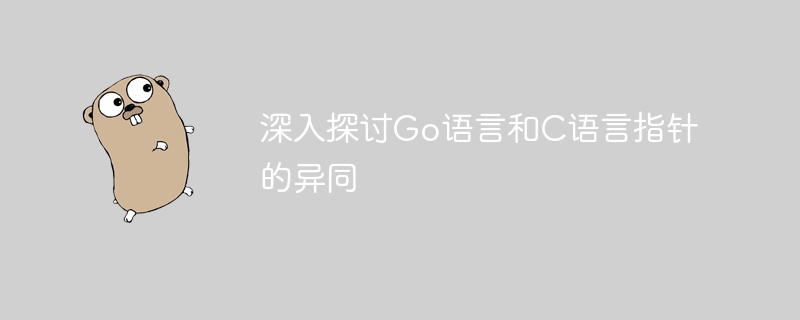

Go language and C language are two very popular programming languages. They have many things in common, such as supporting pointers. This article will deeply explore the similarities and differences between Go language and C language pointers in terms of the concept, declaration, and operation of pointers, and compare and illustrate them through specific code examples.
First of all, let us first understand the basic concepts of pointers in programming. A pointer is a variable that stores the address of a variable and can be used to indirectly access the value of the variable. In C language, pointers are a very important and flexible concept, and in Go language, pointers also play an important role.
In C language, you need to use the "*" symbol to declare a pointer, for example:
int *ptr;
This declares a pointer ptr pointing to an integer variable. Then, you can get the address of the variable through the "&" symbol and assign the address to the pointer, for example:
int num = 10; int *ptr = #
In this example, ptr points to the address of the num variable. The value pointed to by the ptr pointer can be accessed through the "*" symbol, for example:
printf("%d", *ptr); // 输出结果为10In Go language, declaring a pointer also requires the use of the "*" symbol, for example:
var ptr *int
A pointer ptr pointing to an integer variable is declared. The difference is that the pointer type declaration method in Go language is more concise, for example:
num := 10 ptr := &num
In this example, ptr also points to the address of the num variable. The value pointed to by the ptr pointer can be accessed through the "*" symbol, for example:
fmt.Println(*ptr) // 输出结果为10
Next, let's take a look at the operation of the pointer. In C language, pointers can perform pointer operations, such as adding or subtracting an integer to point to different addresses. You can also perform subtraction operations between pointers and calculate the distance between two pointers. For example:
int arr[5] = {1, 2, 3, 4, 5};
int *ptr = arr;
ptr++; // 将指针移动到下一个元素In the Go language, due to security considerations, pointer operations are subject to certain restrictions, and pointer operations and subtraction operations between pointers cannot be performed. However, pointers can be passed to modify the value, for example:
func changeValue(ptr *int) {
*ptr = 20
}
num := 10
ptr := &num
changeValue(ptr)
fmt.Println(num) // 输出结果为20In summary, Go language and C language have many similarities in the concept and basic usage of pointers, but there are differences in specific operations. There are some differences. Pointer operations in C language are more flexible, but are also more prone to errors; while Go language restricts pointer operations, which improves the security of the code, but also sacrifices some flexibility.
Through the comparison and examples of pointers in Go language and C language in this article, I hope readers can have a deeper understanding of the usage and differences of pointers in these two languages, so as to better apply pointers to implement program logic.
The above is the detailed content of In-depth discussion of the similarities and differences between Go language and C language pointers. For more information, please follow other related articles on the PHP Chinese website!




